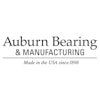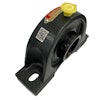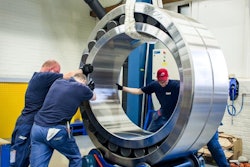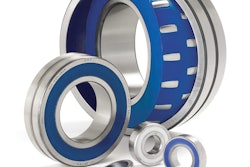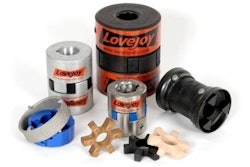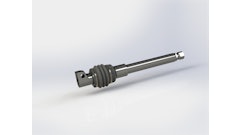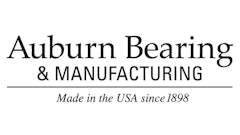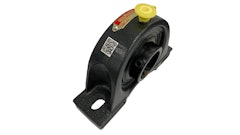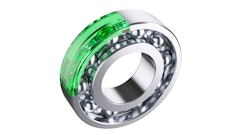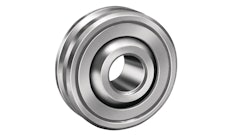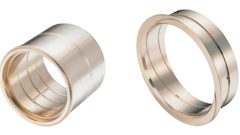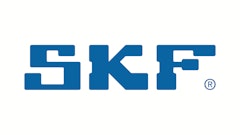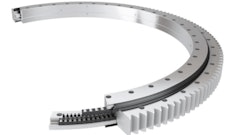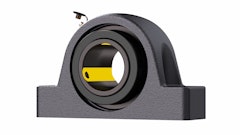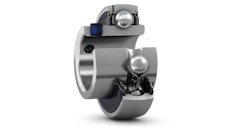The Timken Company, a global leader in bearings and mechanical power transmission products, reports fourth-quarter 2016 sales of $655 million, down 8.3% from the same period a year ago. The results reflect weakness across most end markets and unfavorable currency, partially offset by the benefit of acquisitions.
In the fourth quarter, Timken posted net income of $24.1 million or $0.31 per diluted share, versus a net loss of $(35.7) million or $(0.44) per basic share for the same period a year ago. The year-over-year improvement in net income was driven by lower pension settlement charges, CDSOA income1 and lower operating costs, partially offset by lower volume and unfavorable price/mix. The year-ago period also included a gain from the divestiture of the aerospace PMA business and higher discrete income tax benefits.
Excluding special items (detailed in the attached tables), adjusted net income was $36.7 million or $0.47 per diluted share. This compares with adjusted net income of $49.0 million or $0.59 per diluted share for the same period in 2015. The decline in adjusted net income reflects lower volume and unfavorable price/mix, partially offset by the benefit of SG&A cost reduction initiatives and lower material costs.
"We performed well in the fourth quarter, giving us a solid finish to the year," says Richard G. Kyle, Timken President and Chief Executive Officer. "Despite the difficult market environment, we delivered historically strong earnings and cash flow in 2016, which is evidence of the structural improvements we've made to our business. We advanced our strategy on all fronts and continued to position the company for profitable growth and shareholder value creation over the long term."
Among significant accomplishments during the quarter, the company acquired EDT Corp., a manufacturer of polymer housed units and stainless steel ball bearings used widely by the food and beverage industry. The company also returned $38 million in capital to shareholders through the repurchase of roughly 480,000 shares and the payment of its 378th consecutive quarterly dividend. Earlier this month, the Timken Board of Directors approved a new share repurchase authorization for up to 10 million shares, expiring February 28, 2021. This replaces the prior authorization which expired January 31, 2017.
1 Represents funds received by the company under the U.S. Continued Dumping and Subsidy Offset Act (CDSOA).
2016 Full-Year Results
For 2016, sales were $2.7 billion or 7% lower than 2015. The decrease was primarily driven by weaker demand across industrial end markets and unfavorable currency, partially offset by growth in automotive and the net benefit of acquisitions and divestitures.
Net income was $152.6 million or $1.92 per diluted share for the year, versus a net loss of ($70.8) million or ($0.84) per basic share a year ago. The year-over-year increase in net income was driven by lower pension settlement charges, current year CDSOA income, as well as lower operating costs, partially offset by lower volume, unfavorable price/mix and currency. The year-ago period also included a gain from the divestiture of the aerospace PMA business and higher discrete income tax benefits.
Excluding special items, adjusted net income was $156.2 million or $1.97 per diluted share. This compares with $189.1 million or $2.21 per diluted share in 2015. The decline in adjusted net income reflects lower volume and unfavorable price/mix, partially offset by lower material, manufacturing and SG&A costs (including the benefit of cost reduction initiatives). Earnings per share also benefited from the repurchase of approximately 4% of the company's outstanding shares in 2016.
Fourth-Quarter Segment Results
Mobile Industries reported fourth-quarter sales of $342.3 million, 10% lower than the same period a year ago, driven primarily by lower demand in the rail, automotive and aerospace sectors, as well as unfavorable currency.
Earnings before interest and taxes (EBIT) in the quarter were $19.2 million or 5.6% of sales, compared with EBIT of $58.9 million or 15.5% of sales for the same period a year ago. The decrease in EBIT reflects lower volume and unfavorable price/mix, partially offset by lower SG&A expenses and favorable material and manufacturing costs. The year-ago period also included a gain from the divestiture of the aerospace PMA business.
Excluding special items, adjusted EBIT in the quarter was $26.5 million or 7.7% of sales, compared with $36.2 million or 9.5% of sales in the fourth quarter last year.
Process Industries sales of $312.5 million for the fourth quarter declined 6.5% from the same period a year ago, driven primarily by weaker demand in the industrial aftermarket and heavy industries sectors, lower military marine revenue and unfavorable currency, partially offset by the benefit of acquisitions.
EBIT for the quarter was $43.2 million or 13.8% of sales, compared with EBIT of $45.2 million or 13.5% of sales for the same period a year ago. The decrease in EBIT was driven by the impact of lower volume and unfavorable price/mix, partially offset by favorable SG&A and material costs. The year-ago period also included a fixed asset write-off charge.
Excluding special items, adjusted EBIT in the quarter was $45.8 million or 14.6% of sales, compared with $55.7 million or 16.75 of sales in the fourth quarter last year.
2017 Outlook
The company expects 2017 revenue to be relatively flat compared with 2016. This includes a negative currency impact of roughly 1.5%, based on December 31, 2016, exchange rates. Within its segments, the company estimates full-year 2017:
- Mobile Industries' sales to be down approximately 4-5%, driven primarily by market-related declines in the rail sector, continued softness in the agriculture and heavy truck sectors, and unfavorable currency.
- Process Industries' sales to be up approximately 4-5%, reflecting growth in the industrial aftermarket and wind energy sectors, and the benefit of acquisitions, offset partially by unfavorable currency.
"Sentiment in most of our markets has improved over the last few months, and while we are forecasting the full year to be relatively flat, we are planning for sequential strengthening as we move through 2017," says Kyle. "We will continue to navigate the environment with discipline and flexibility, staying focused on outgrowing our markets, managing our costs and investing in our business for the long term. As markets improve, we are confident in our ability to achieve new levels of financial performance."
Timken plans to adopt mark-to-market pension accounting for its defined benefit pension and other post-retirement benefit plans in the first quarter of 2017. This change will have no effect on employees' retirement benefits, plan funding requirements or Timken cash flows. Under the new accounting method, the company will immediately recognize actuarial gains and losses in the year in which they occur (in the fourth quarter or earlier as required) rather than amortizing them over many years.
This change is expected to add approximately $0.15 to earnings per share for 20172. Including this impact, Timken anticipates 2017 earnings per diluted share to range from $1.90 to $2.00 for the full year on a GAAP basis. Excluding restructuring and other special items, the company expects 2017 adjusted earnings per diluted share to range from $2.05 to $2.15. In connection with the adoption of mark-to-market accounting, prior-year results will be retrospectively modified to reflect the new method. Adjusted earnings for 2016 are expected to be revised upward by approximately $0.15 per diluted share. Additional information will be provided in conjunction with the company's first quarter 2017 earnings release.

